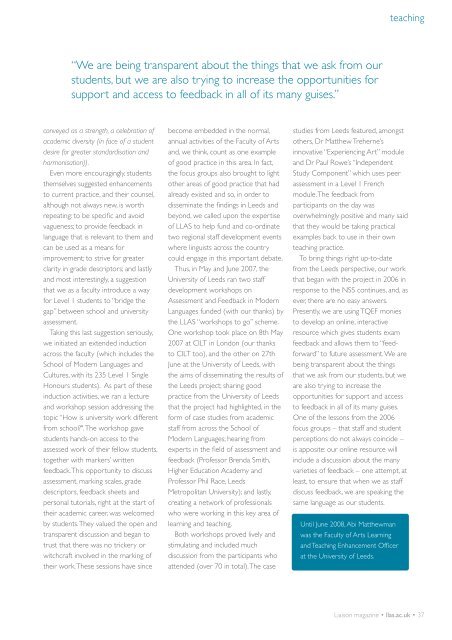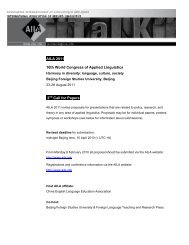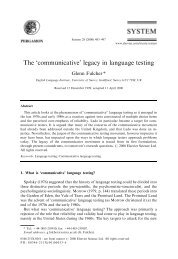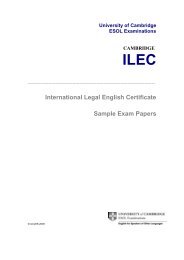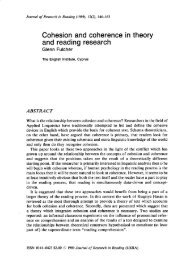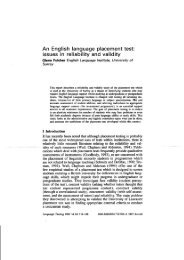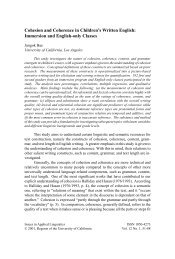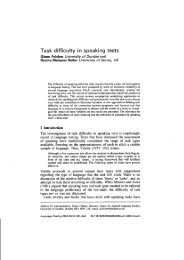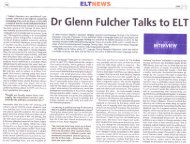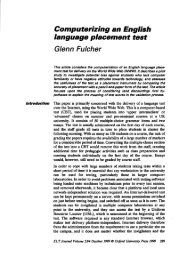Liaison Magazine - LLAS Centre for Languages, Linguistics and ...
Liaison Magazine - LLAS Centre for Languages, Linguistics and ...
Liaison Magazine - LLAS Centre for Languages, Linguistics and ...
Create successful ePaper yourself
Turn your PDF publications into a flip-book with our unique Google optimized e-Paper software.
teaching<br />
“We are being transparent about the things that we ask from our<br />
students, but we are also trying to increase the opportunities <strong>for</strong><br />
support <strong>and</strong> access to feedback in all of its many guises.”<br />
conveyed as a strength, a celebration of<br />
academic diversity (in face of a student<br />
desire <strong>for</strong> greater st<strong>and</strong>ardisation <strong>and</strong><br />
harmonisation)).<br />
Even more encouragingly, students<br />
themselves suggested enhancements<br />
to current practice, <strong>and</strong> their counsel,<br />
although not always new, is worth<br />
repeating: to be specific <strong>and</strong> avoid<br />
vagueness; to provide feedback in<br />
language that is relevant to them <strong>and</strong><br />
can be used as a means <strong>for</strong><br />
improvement; to strive <strong>for</strong> greater<br />
clarity in grade descriptors; <strong>and</strong> lastly<br />
<strong>and</strong> most interestingly, a suggestion<br />
that we as a faculty introduce a way<br />
<strong>for</strong> Level 1 students to “bridge the<br />
gap” between school <strong>and</strong> university<br />
assessment.<br />
Taking this last suggestion seriously,<br />
we initiated an extended induction<br />
across the faculty (which includes the<br />
School of Modern <strong>Languages</strong> <strong>and</strong><br />
Cultures, with its 235 Level 1 Single<br />
Honours students). As part of these<br />
induction activities, we ran a lecture<br />
<strong>and</strong> workshop session addressing the<br />
topic “How is university work different<br />
from school".The workshop gave<br />
students h<strong>and</strong>s-on access to the<br />
assessed work of their fellow students,<br />
together with markers’ written<br />
feedback.This opportunity to discuss<br />
assessment, marking scales, grade<br />
descriptors, feedback sheets <strong>and</strong><br />
personal tutorials, right at the start of<br />
their academic career, was welcomed<br />
by students.They valued the open <strong>and</strong><br />
transparent discussion <strong>and</strong> began to<br />
trust that there was no trickery or<br />
witchcraft involved in the marking of<br />
their work.These sessions have since<br />
become embedded in the normal,<br />
annual activities of the Faculty of Arts<br />
<strong>and</strong>, we think, count as one example<br />
of good practice in this area. In fact,<br />
the focus groups also brought to light<br />
other areas of good practice that had<br />
already existed <strong>and</strong> so, in order to<br />
disseminate the findings in Leeds <strong>and</strong><br />
beyond, we called upon the expertise<br />
of <strong>LLAS</strong> to help fund <strong>and</strong> co-ordinate<br />
two regional staff development events<br />
where linguists across the country<br />
could engage in this important debate.<br />
Thus, in May <strong>and</strong> June 2007, the<br />
University of Leeds ran two staff<br />
development workshops on<br />
Assessment <strong>and</strong> Feedback in Modern<br />
<strong>Languages</strong> funded (with our thanks) by<br />
the <strong>LLAS</strong> “workshops to go” scheme.<br />
One workshop took place on 8th May<br />
2007 at CILT in London (our thanks<br />
to CILT too), <strong>and</strong> the other on 27th<br />
June at the University of Leeds, with<br />
the aims of disseminating the results of<br />
the Leeds project; sharing good<br />
practice from the University of Leeds<br />
that the project had highlighted, in the<br />
<strong>for</strong>m of case studies from academic<br />
staff from across the School of<br />
Modern <strong>Languages</strong>; hearing from<br />
experts in the field of assessment <strong>and</strong><br />
feedback (Professor Brenda Smith,<br />
Higher Education Academy <strong>and</strong><br />
Professor Phil Race, Leeds<br />
Metropolitan University); <strong>and</strong> lastly,<br />
creating a network of professionals<br />
who were working in this key area of<br />
learning <strong>and</strong> teaching.<br />
Both workshops proved lively <strong>and</strong><br />
stimulating <strong>and</strong> included much<br />
discussion from the participants who<br />
attended (over 70 in total).The case<br />
studies from Leeds featured, amongst<br />
others, Dr Matthew Treherne’s<br />
innovative “Experiencing Art” module<br />
<strong>and</strong> Dr Paul Rowe’s “Independent<br />
Study Component” which uses peer<br />
assessment in a Level 1 French<br />
module.The feedback from<br />
participants on the day was<br />
overwhelmingly positive <strong>and</strong> many said<br />
that they would be taking practical<br />
examples back to use in their own<br />
teaching practice.<br />
To bring things right up-to-date<br />
from the Leeds perspective, our work<br />
that began with the project in 2006 in<br />
response to the NSS continues, <strong>and</strong>, as<br />
ever, there are no easy answers.<br />
Presently, we are using TQEF monies<br />
to develop an online, interactive<br />
resource which gives students exam<br />
feedback <strong>and</strong> allows them to “feed<strong>for</strong>ward”<br />
to future assessment.We are<br />
being transparent about the things<br />
that we ask from our students, but we<br />
are also trying to increase the<br />
opportunities <strong>for</strong> support <strong>and</strong> access<br />
to feedback in all of its many guises.<br />
One of the lessons from the 2006<br />
focus groups – that staff <strong>and</strong> student<br />
perceptions do not always coincide –<br />
is apposite: our online resource will<br />
include a discussion about the many<br />
varieties of feedback – one attempt, at<br />
least, to ensure that when we as staff<br />
discuss feedback, we are speaking the<br />
same language as our students.<br />
Until June 2008, Abi Matthewman<br />
was the Faculty of Arts Learning<br />
<strong>and</strong> Teaching Enhancement Officer<br />
at the University of Leeds.<br />
<strong>Liaison</strong> magazine • llas.ac.uk •37


